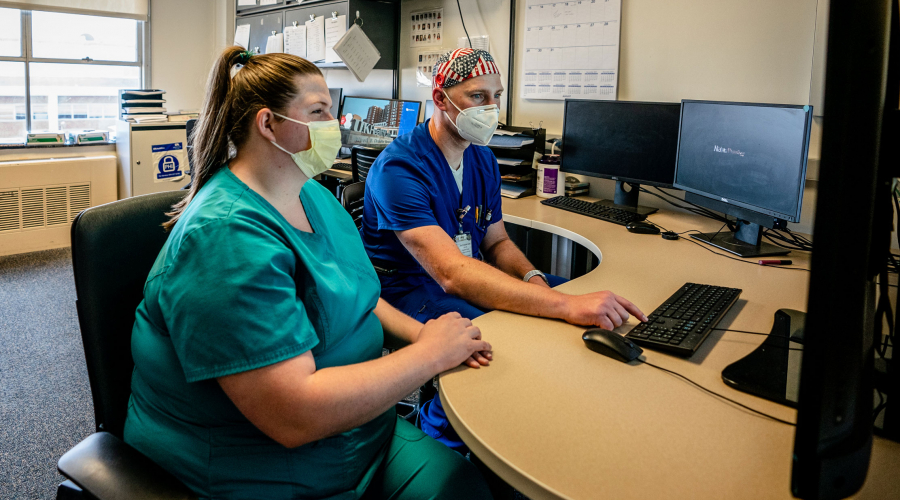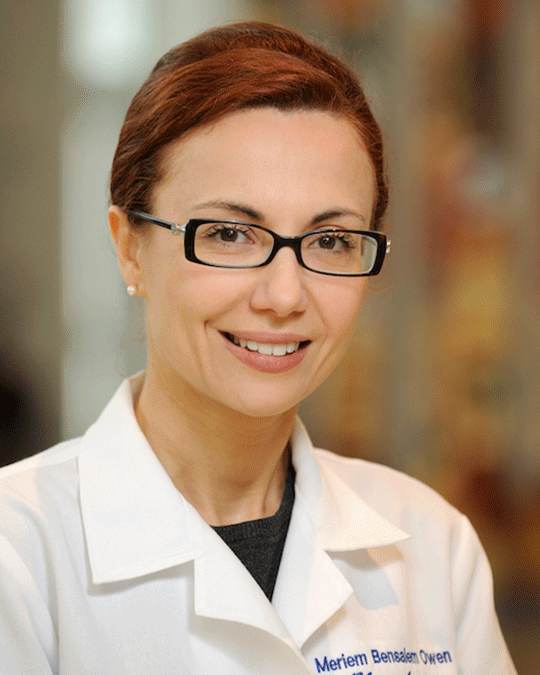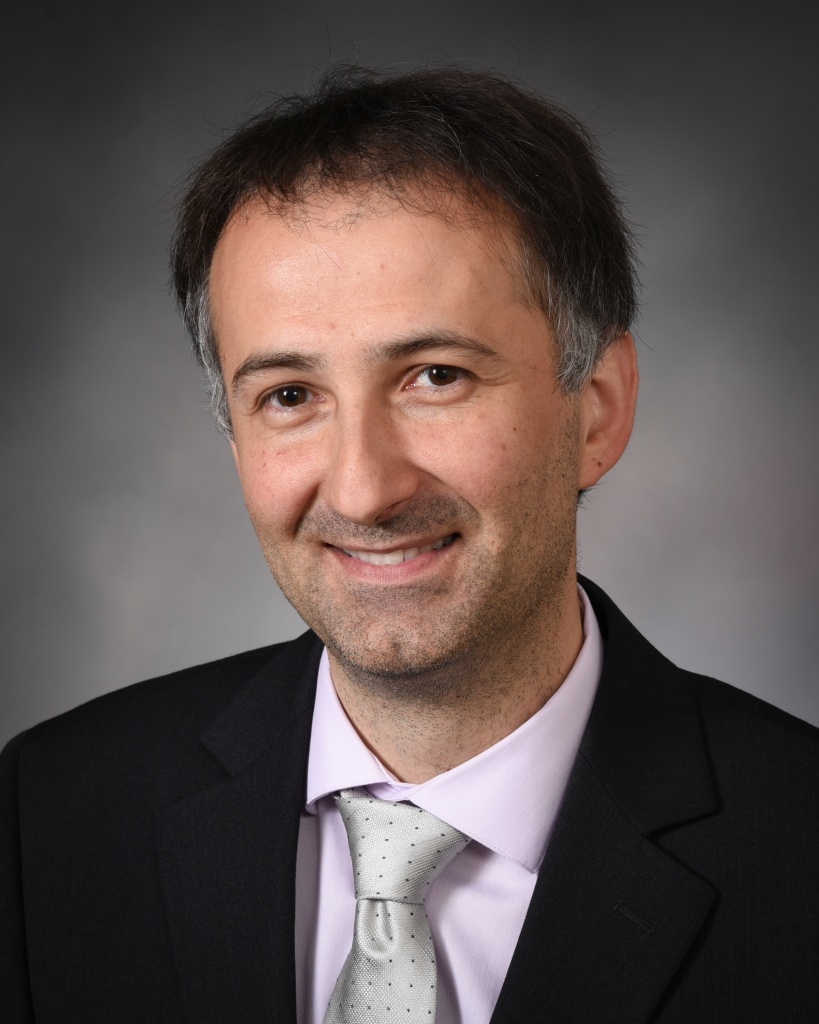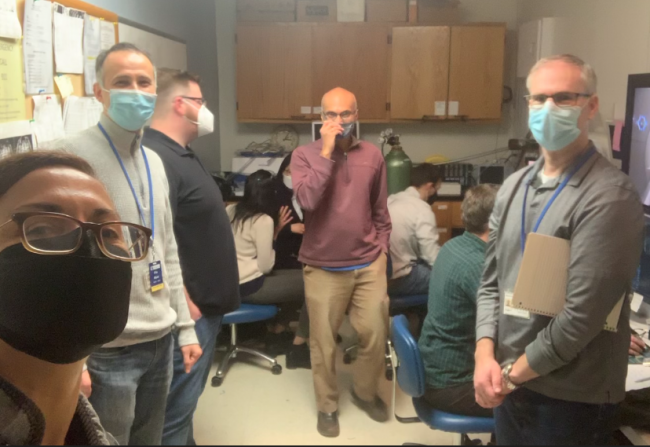
FINDERS: An Alliance of Clinicians, Scientists to Treat Epileptic Seizures
Joining Forces to Treat Epileptic Seizures
Meriem Bensalem-Owen, MD, and Brian Gold, PhD, might not have ever had the chance to work on projects together. Dr. Bensalem-Owen is a physician who spends much of her time at the patients’ bedside, reviewing video-EEG monitoring studies, or in clinic treating patients with epilepsy, and Dr. Gold is a researcher who studies age-related brain and cognitive changes in the lab. Flavius Raslau, MD, a physician who specializes in imaging of the brain, had the vision of bringing together clinicians and researchers around the advancement of epilepsy care.
Thanks to the University of Kentucky College of Medicine’s Alliance Research Initiative, they have joined forces to better localize, and ultimately treat, epileptic seizures.
FINDERS Alliance
Dr. Bensalem-Owen, professor in the department of neurology, and Dr. Gold, professor in the department of neuroscience, are co-principal investigators of the Functional Imaging for NeuroDiagnostics for Epilepsy and Resective Surgery (FINDERS) Alliance. Dr. Raslau, associate professor in the department of radiology, leads the alliance presently. This team aims to improve diagnosis methods and care for seizures through the development of new brain imaging methods, as well as the advancement of neuroimaging systems in clinical practice.
“We are the epitome of what this Alliance was intended to be, a group of people who would have never really necessarily collaborated before,” Dr. Gold said. “We really are trying to be a model for showing that clinicians can be part of a research team and work together with scientists toward a common goal.”
Wide Range of Specialists
FINDERS possesses a wide range of specialists including radiologists, neurologists, neurosurgeons, neuropsychologists, nurses, technologists as well as engineers, neuroscientists, neuroimagers, physicists, biostatisticians, and other researchers from the colleges of medicine, engineering, and public health. The team is supported by the Alliance Research Initiative, UK HealthCare, the Office of the Vice President for Research, and the Neuroscience Research Priority Area.
Finding Solutions Together
The first step for the multidisciplinary team is attempting to better recognize where a seizure occurs in the brain. That process is enhanced by having a team that balances clinical and research expertise. Physicians treat patients with epilepsy and then bring their expertise and enthusiasm to researchers who use modern-imaging technology. Together, they can find solutions.
“The mindset is very different between the clinicians and the PhDs, and it's really nice to sit down and go through these ideas together,” Dr. Bensalem-Owen said. “We really complement each other very nicely.”
A relatively new team, FINDERS faced challenges starting a research team right before a global pandemic, including the immediate need to switch to virtual meetings and the navigation around lab and clinical restrictions early on.




Colleagues Throughout the World
Over the past year, the team capitalized on associations with colleagues across the United States, Canada, and even Europe. These connections have allowed FINDERS team members to build upon emerging findings rather than “reinventing the wheel” and handle challenges more efficiently.
For example, one project has group members examining electrical recordings in the brain that show when a seizure happens and then trying to combine this process with a functional MRI that gives more information about the seizure’s location in the brain. Members of FINDERS are able to reach out to local, national, and international colleagues who have dealt with similar issues, saving both time and trouble. Thus, the science moves forward, which helps patients – and that is the main goal.
Just the Beginning But Lots of Potential
Because it is a relatively new team, FINDERS is still in the process of obtaining grants, but there is a lot of potential. Dr. Bensalem-Owen and Dr. Gold see their team’s work enduring for years. For example, Dr. Raslau explains, “One of our projects involves creating a new workflow for doing MRI immediately after a seizure happens. I can see this becoming a standard-of-care practice and spreading to other medical centers.”
“Our ultimate success is going to be our lasting connection and collaboration going forward, which is going to spawn multiple potential projects,” Dr. Gold said. “At the end of the day, the work is going to be worth the wait because what we are building could snowball into something that I think is very positive and could extend beyond this Alliance, and that's what I look forward to.”
Find out more about FINDERS and other Alliance teams here.
FINDERS Alliance Team Members:
Neurology
- Timothy Ainger, PhD, Assistant Professor
- Meriem Bensalem-Owen, MD, Professor
- Ima M. Ebong, MD, Assistant Professor
- Larry Goldstein, MD, Chair and Professor
- Siddharth Kapoor, MD, Associate Professor
- G. Qutubuddin Khan, MD, Associate Professor
- Zabeen K. Mahuwala, MD, Assistant Professor
- Sally V. Mathias, MD, Assistant Professor
- Farhan Mirza, MD, Fellow at MNI
- Ruta Yardi, MD, Assistant Professor
- Julie Youssefi, MD, Epilepsy Fellow
Neuroscience
- Brian Gold, PhD, Professor
- David Powell, PhD, Assistant Professor
Neurodiagnostic Services
- Susan Hollar MBA, R.EEGT
College of Public Health
- Richard Kryscio, PhD, Professor
College of Engineering
- Jihye Bae, PhD, Assistant Professor
- Kevin Donohue, PhD, Professor
- Sridhar Sunderam, PhD, Associate Professor
Radiology
- Riham El-Khouli, MD, PhD, Assistant Professor
- Peter Hardy, PhD, Associate Professor
- M. Elizabeth Oates, MD, Chair and Professor
- Flavius Raslau, MD, Associate Professor
McGill University
Jean Gotman, PhD, Professor and Lab Director